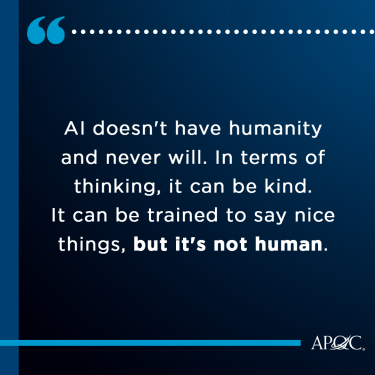
For APQC keynote April Rinne, change is a business and life feature that can be embraced rather than feared with the right “flux superpowers” or new ways for viewing and navigating change. As a futurist and author, April Rinne is recognized for her ability to identify key shifts early amid chaos and disruption and translate this vision in ways that help people and businesses find peace, catalyze growth, and flourish.
In a recent Q&A with APQC’s Cindy Hubert, April talks about the importance of shifting one’s mindset on change: “We need to ask ourselves, how are we showing up, and what is our relationship and attitude about change? We will forever be hindered in terms of what we're going to do about it, what actions we're going to take, how we're going to move forward, set strategy, and so forth if we’re not in tune with our perspective on it.”
Run Slower to Impact and Embrace Change
In a recent study on the top threats in knowledge management, APQC identified the number four threat as People dealing with a lot of change, which makes it harder to motivate new behaviors.
April explains how professionals struggle with fast and frequent change and how this can play a significant role in fatigue:
“With the pace and frequency of change, there is anxiety, burnout, exhaustion, and change fatigue. And this provides perspective on how we view change. This obsession with more, more, more, more somehow presents more as better. But the truth is, more is just more. More is not necessarily always better. For many, it becomes, I love my job, but I’m exhausted.”
When asked what can be done to improve our response to change, April’s reply was simple: Slow down.
“If the pace of change is increasing, and we're already feeling exhausted today, and society says that when the pace of change increases, we're supposed to run faster, it can be too much. And from a process and knowledge management perspective, that's not sustainable. It doesn't work, so there’s a huge opportunity today to rethink and redesign some of those processes, systems, and relationships.”
Slowing down allows you to recharge, replenish, and take a beat.
“When you learn to move slower, you begin to see things you hadn’t noticed before and begin thinking, maybe that business model isn't working well, or that expectation or assumption is flawed. Or you think, geez, I’ve been spending all this money on stuff that doesn't seem to be having the positive effect I had hoped on our team or our culture. What if I just had a conversation about it instead? There is value in pausing, slowing down, and returning to the drawing board.”
Embracing Your Humanness in an Evolving AI World
Over the past century, many changes have impacted how business gets done, but none quite as powerful as AI and generative AI. And the impact on process and knowledge professionals will be significant over the next couple of years, if not already. According to APQC’s 2023 People of Process Management survey, AI and process automation are the top two competencies for process professionals to develop in the next eighteen months. Likewise, the 2024 Knowledge Management Priorities and Prediction Survey Report reports incorporating AI/generative AI and smart technology and transferring expert knowledge as a top five priority for KM teams.
Knowing this, we were curious to understand April’s thoughts on the fast evolution of AI in the workplace and how people can remain centered amongst all the changes.
APQC’s Cindy Hubert poses the question: Artificial intelligence, generative AI, it’s all top of mind. Do you have any thoughts or connections that we need to make to be more human in this age where technology is advancing faster than it ever has before?
April: Most people know they might have different ideas of what their robot (or, interchangeably, technology) looks like. But we all have this fear of a robot that could replace us in our work, or could it be a friend and work together? Interestingly, AI doesn't have humanity and never will. In terms of thinking, it can be kind, it can. It can be trained to say nice things, but it's not human. It's not the complexity, the beauty, the joy, and the multitudes that a human is. The hype is more around the fear that we have about it. If we really pay attention, scratch between the surface and say, what's going on? What are humans experiencing here? You start to see that the more we are bombarded by technology, the more boxes we interact with, and the more impersonal transactions we have, the more valuable human relationships become.
Watch additional Q&A highlights:
Learn more about April Rinne’s keynote session at APQC’s 2024 Conference!


